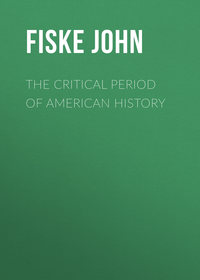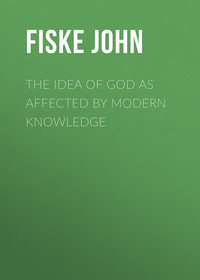 полная версия
полная версияA Century of Science, and Other Essays
The struggle between the machine-like socialistic despotism of New France and the free and spontaneous political vitality of New England is one of the most instructive object lessons with which the experience of mankind has furnished us. The depth of its significance is equalled by the vastness of its consequences. Never did Destiny preside over a more fateful contest; for it determined which kind of political seed should be sown all over the widest and richest political garden plot left untilled in the world. Free industrial England pitted against despotic militant France for the possession of an ancient continent reserved for this decisive struggle, and dragging into the conflict the belated barbarism of the Stone Age, – such is the wonderful theme which Parkman has treated. When the vividly contrasted modern ideas and personages are set off against the romantic though lurid background of Indian life, the artistic effect becomes simply magnificent. Never has historian grappled with another such epic theme, save when Herodotus told the story of Greece and Persia, or when Gibbon's pages resounded with the solemn tread of marshalled hosts through a thousand years of change.
The story of Mr. Parkman's life can be briefly told. He was born in Boston, in what is now known as Allston Street, September 16, 1823. His ancestors had for several generations been honourably known in Massachusetts. His great-grandfather, Rev. Ebenezer Parkman, a graduate of Harvard in 1741, was minister of the Congregational church in Westborough for nearly sixty years; he was a man of learning and eloquence, whose attention was not all given to Calvinistic theology, for he devoted much of it to the study of history. A son of this clergyman, at the age of seventeen, served as private in a Massachusetts regiment in that greatest of modern wars which was decided on the Heights of Abraham. How little did this gallant youth dream of the glory that was by and by to be shed on the scenes and characters passing before his eyes by the genius of one of his own race and name! Another son of Ebenezer Parkman returned to Boston and became a successful merchant, engaged in that foreign traffic which played so important and liberalizing a part in American life in the days before the Enemy of mankind had invented forty per cent tariffs. The home of this merchant, Samuel Parkman, on the corner of Green and Chardon streets, was long famous for its beautiful flower garden, indicating perhaps the kind of taste and skill so conspicuous afterwards in his grandson. In Samuel the clerical profession skipped one generation, to be taken up again by his son, Rev. Francis Parkman, a graduate of Harvard in 1807, and for many years after 1813 the eminent and beloved pastor of the New North Church. Dr. Parkman was noted for his public spirit and benevolence. Bishop Huntington, who knew him well, says of him: "Every aspect of suffering touched him tenderly. There was no hard spot in his breast. His house was the centre of countless mercies to various forms of want; and there were few solicitors of alms, local or itinerant, and whether for private necessity or public benefactions, that his doors did not welcome and send away satisfied… For many years he was widely known and esteemed for his efficient interest in some of our most conspicuous and useful institutions of philanthropy. Among these may be especially mentioned the Massachusetts Bible Society, the Society for Propagating the Gospel, the Orphan Asylum, the Humane Society, the Medical Dispensary, the Society for the Relief of Aged and Destitute Clergymen, and the Congregational Charitable Society." He also took an active interest in Harvard University, of which he was an Overseer. In 1829 he founded there the professorship of "Pulpit Eloquence and the Pastoral Care," familiarly known as the Parkman Professorship. A pupil and friend of Channing, he was noted among Unitarians for a broadly tolerant disposition. His wealth of practical wisdom was enlivened by touches of mirth, so that it was said that you could not "meet Dr. Parkman in the street, and stop a minute to exchange words with him, without carrying away with you some phrase or turn of thought so exquisite in its mingled sagacity and humour that it touched the inmost sense of the ludicrous, and made the heart smile as well as the lips." Such was the father of our historian.
Mr. Parkman's mother was a descendant of Rev. John Cotton, one of the most eminent of the leaders in the great Puritan exodus of the seventeenth century. She was the daughter of Nathaniel Hall, of Medford, member of a family which was represented in the convention that framed the Constitution of Massachusetts in 1780. Caroline Hall was a lady of remarkable character, and many of her fine qualities were noticeable in her distinguished son. Of her the late Octavius Frothingham says: "Humility, charity, truthfulness, were her prime characteristics. Her conscience was firm and lofty, though never austere. She had a strong sense of right, coupled with perfect charity toward other people; inflexible in principle, she was gentle in practice. Intellectually she could hardly be called brilliant or accomplished, but she had a strong vein of common sense and practical wisdom, great penetration into character, and a good deal of quiet humour."
Of her six children, the historian, Francis Parkman, was the eldest. As a boy his health was delicate. In a fragment of autobiography, written in the third person, he tells us that "his childhood was neither healthful nor buoyant," and "his boyhood, though for a time active, was not robust." There was a nervous irritability and impulsiveness which kept driving him into activity more intense than his physical strength was well able to bear. At the same time an inborn instinct of self-control, accompanied, doubtless, by a refined unwillingness to intrude his personal feelings upon the notice of other people, led him into such habits of self-repression that his friends sometimes felicitated him on "having no nerves." There was something rudely stoical in his discipline. As he says: "It was impossible that conditions of the nervous system abnormal as his had been from infancy should be without their effects on the mind, and some of these were of a nature highly to exasperate him. Unconscious of their character and origin, and ignorant that with time and confirmed health they would have disappeared, he had no other thought than that of crushing them by force, and accordingly applied himself to the work. Hence resulted a state of mental tension, habitual for several years, and abundantly mischievous in its effects. With a mind overstrained and a body overtasked, he was burning his candle at both ends."
The conditions which were provided for the sensitive and highly strung boy during a part of his childhood were surely very delightful, and there can be little doubt that they served to determine his career. His grandfather Hall's home in Medford was situated on the border of the Middlesex Fells, a rough and rocky woodland, four thousand acres in extent, as wild and savage in many places as any primeval forest. The place is within eight miles of Boston, and it may be doubted if anywhere else can be found another such magnificent piece of wilderness so near to a great city. It needs only a stray Indian or two, with a few bears and wolves, to bring back for us the days when Winthrop's company landed on the shores of the neighbouring bay. In the heart of this shaggy woodland is Spot Pond, a lake of glorious beauty, with a surface of three hundred acres, and a homely name which it is to be hoped it may always keep, – a name bestowed in the good old times before the national vice of magniloquence had begun to deface our maps. Among the pleasure drives in the neighbourhood of Boston, the drive around Spot Pond is perhaps foremost in beauty. A few fine houses have been built upon its borders, and well-kept roads have given to some parts of the forest the aspect of a park, but the greater part of the territory is undisturbed, and will probably remain so. Seventy years ago the pruning hand of civilization has scarcely touched it. To his grandfather's farm, on the outskirts of this enchanting spot, the boy Parkman was sent in his eighth year. There, he tells us, "I walked twice a day to a school of high but undeserved reputation, about a mile distant, in the town of Medford. Here I learned very little, and spent the intervals of schooling more profitably in collecting eggs, insects, and reptiles, trapping squirrels and woodchucks, and making persistent though rarely fortunate attempts to kill birds with arrows. After four years of this rustication I was brought back to Boston, when I was unhappily seized with a mania for experiments in chemistry, involving a lonely, confined, unwholesome sort of life, baneful to body and mind." No doubt the experience of four years of plastic boyhood in Middlesex Fells gave to Parkman's mind the bent which directed him toward the history of the wilderness. This fact he recognized of himself in after life, while he recalled those boyish days as the brightest in his memory.
At the age of fifteen or so the retorts and crucibles were thrown away forever, and a reaction in favor of woodland life began; "a fancy," he says, "which soon gained full control over the course of the literary pursuits to which he was also addicted." Here we come upon the first mention of the combination of interests which determined his career. A million boys might be turned loose in Middlesex Fells, one after another, there to roam in solitude until our globe should have entered upon a new geological period, and the chances are against any one of them becoming a great historian, or anything else above mediocrity. But in Parkman, as in all men of genius, the dominant motive power was something within him, something which science has not data enough to explain. The divine spark of genius is something which we know only through the acts which it excites. In Parkman the strong literary instinct showed itself at Chauncy Hall School, where we find him, at fourteen years of age, eagerly and busily engaged in the study and practice of English composition. It was natural that tales of heroes should be especially charming at that time of life, and among Parkman's efforts were paraphrasing parts of the Æneid, and turning into rhymed verse the scene of the tournament in "Ivanhoe." From the artificial stupidity which is too often superinduced in boys by their early schooling he was saved by native genius and breezy woodland life, and his progress was rapid. In 1840, having nearly completed his seventeenth year, he entered Harvard College. His reputation there for scholarship was good, but he was much more absorbed in his own pursuits than in the regular college studies. In the summer vacation of 1841 he made a rough journey of exploration in the woods of northern New Hampshire, accompanied by one classmate and a native guide, and there he had a taste of adventure slightly spiced with hardship.
How much importance this ramble may have had one cannot say, but he tells us that "before the end of the Sophomore year my various schemes had crystallized into a plan of writing the story of what was then known as the 'Old French War,' – that is, the war that ended in the conquest of Canada; for here, as it seemed to me, the forest drama was more stirring, and the forest stage more thronged with appropriate actors, than in any other passage of our history. It was not until some years later that I enlarged the plan to include the whole course of the American conflict between France and England, or, in other words, the history of the American forest; for this was the light in which I regarded it. My theme fascinated me, and I was haunted with wilderness images day and night." The way in which true genius works could not be more happily described.
When the great scheme first took shape in Mr. Parkman's mind, he reckoned that it would take about twenty years to complete the task. How he entered upon it may best be told in his own words: —
"The time allowed was ample; but here he fell into a fatal error, entering on this long pilgrimage with all the vehemence of one starting on a mile heat. His reliance, however, was less on books than on such personal experience as should in some sense identify him with his theme. His natural inclinations urged him in the same direction, for his thoughts were always in the forest, whose features, not unmixed with softer images, possessed his waking and sleeping dreams, filling him with vague cravings impossible to satisfy. As fond of hardships as he was vain of enduring them, cherishing a sovereign scorn for every physical weakness or defect, deceived moreover by a rapid development of frame and sinews which flattered him with the belief that discipline sufficiently unsparing would harden him into an athlete, he slighted the precautions of a more reasonable woodcraft, tired old foresters with long marches, stopped neither for heat nor rain, and slept on the earth without a blanket." In other words, "a highly irritable organism spurred the writer to excess in a course which, with one of different temperament, would have produced a free and hardy development of such faculties and forces as he possessed." Along with the irritable organism perhaps a heritage of fierce ancestral Puritanism may have prompted him to the stoical discipline which sought to ignore the just claims of the physical body. He tells us of his undoubting faith that "to tame the Devil, it is best to take him by the horns;" but more mature experiences made him feel less sure "of the advantages of this method of dealing with that subtle personage."
Under these conditions, perhaps the college vacations which he spent in the woods of Canada and New England may have done more to exhaust than to recruit his strength. In his Junior year, some physical injury, the nature of which does not seem to be known, caused it to be thought necessary to send him to Europe for his health. He went first to Gibraltar in a sailing ship, and a passage from his diary may serve to throw light upon the voyage and the man: "It was a noble sight when at intervals the sun broke out over the savage waves, changing their blackness to a rich blue almost as dark; while the foam that flew over it seemed like whirling snow wreaths on the mountain… As soon as it was daybreak I went on deck. Two or three sails were set. The vessel was scouring along, leaning over so that her lee gunwale scooped up the water; the water in a foam, and clouds of spray flying over us, frequently as high as the main yard. The spray was driven with such force that it pricked the cheek like needles. I stayed on deck two or three hours, when, being thoroughly salted, I went down, changed my clothes, and read 'Don Quixote' till Mr. Snow appeared at the door with 'You are the man that wants to see a gale, are ye? Now is your chance; only just come up on deck.' Accordingly I went. The wind was yelling and howling in the rigging in a fashion that reminded me of a storm in a Canadian forest… The sailors clung, half drowned, to whatever they could lay hold of, for the vessel was at times half inverted, and tons of water washed from side to side of her deck."
Mr. Parkman's route was from Gibraltar by way of Malta, to Sicily, where he travelled over the whole island, and thence to Naples, where he fell in with the great preacher Theodore Parker. Together they climbed Vesuvius and peered into its crater, and afterwards in and about Rome they renewed their comradeship. Here Mr. Parkman wished to spend a few weeks in a monastery, in order to study with his own eyes the priests and their way of life. More than once he met with a prompt and uncompromising refusal, but at length the coveted privilege was granted him; and, curiously enough, it was by the strictest of all the monastic orders, the Passionists, brethren addicted to wearing hair shirts and scourging themselves without mercy. When these worthy monks learned that their visitor was not merely a Protestant, but a Unitarian, their horror was intense; but they were ready for the occasion, poor souls! and tried their best to convert him, thereby doubtless enhancing their value in the historian's eyes as living and breathing historic material. This visit was surely of inestimable service to the pen which was to be so largely occupied with the Jesuits and Franciscans of the New World.
Mr. Parkman did not leave Rome until he had seen temples, churches, and catacombs, and had been presented to the Pope. He stopped at Florence, Bologna, Modena, Parma, and Milan, and admired the Lake of Como, to which, however, he preferred the savage wildness of Lake George. He saw something of Switzerland, went to Paris and London, and did a bit of sight-seeing in Edinburgh and its neighbourhood. From Liverpool he sailed for America; and in spite of the time consumed in this trip we find him taking his degree at Cambridge, along with his class, in 1844. Probably his name stood high in the rank list, for he was at once elected a member of the Phi Beta Kappa Society. After this he entered the Law School, but stayed not long, for his life's work was already claiming him. In his brief vacation journeys he had seen tiny remnants of wilderness here and there in Canada or in lonely corners of New England; now he wished to see the wilderness itself in all its gloom and vastness, and to meet face to face with the dusky warriors of the Stone Age. At this end of the nineteenth century, as already observed, such a thing can no longer be done. Nowhere now, within the United States, does the primitive wilderness exist, save here and there in shreds and patches. In the middle of the century it covered the western half of the continent, and could be reached by a journey of sixteen or seventeen hundred miles, from Boston to the plains of Nebraska. Parkman had become an adept in woodcraft and a dead shot with the rifle, and could do such things with horses, tame or wild, as civilized people never see done except in a circus. There was little doubt as to his ability to win the respect of Indians by outshining them in such deeds as they could appreciate. Early in 1846 he started for the wilderness with Mr. Quincy Shaw. A passage from the preface to the fourth edition of "The Oregon Trail," published in 1872, will here be of interest: —
"I remember, as we rode by the foot of Pike's Peak, when for a fortnight we met no face of man, my companion remarked, in a tone anything but complacent, that a time would come when those plains would be a grazing country, the buffalo give place to tame cattle, houses be scattered along the watercourses, and wolves, bears, and Indians be numbered among the things that were. We condoled with each other on so melancholy a prospect, but with little thought what the future had in store. We knew that there was more or less gold in the seams of those untrodden mountains; but we did not foresee that it would build cities in the West, and plant hotels and gambling houses among the haunts of the grizzly bear. We knew that a few fanatical outcasts were groping their way across the plains to seek an asylum from Gentile persecution; but we did not imagine that the polygamous hordes of Mormons would rear a swarming Jerusalem in the bosom of solitude itself. We knew that more and more, year after year, the trains of emigrant wagons would creep in slow procession towards barbarous Oregon or wild and distant California; but we did not dream how Commerce and Gold would breed nations along the Pacific, the disenchanting screech of the locomotive break the spell of weird, mysterious mountains, woman's rights invade the fastnesses of the Arapahoes, and despairing savagery, assailed in front and rear, veil its scalp locks and feathers before triumphant commonplace. We were no prophets to foresee all this; and had we foreseen it, perhaps some perverse regret might have tempered the ardour of our rejoicing.
"The wild tribe that defiled with me down the gorges of the Black Hills, with its paint and war plumes, fluttering trophies and savage embroidery, bows, arrows, lances, and shields, will never be seen again. Those who formed it have found bloody graves, or a ghastlier burial in the maws of wolves. The Indian of to-day, armed with a revolver and crowned with an old hat, cased possibly in trousers or muffled in a tawdry shirt, is an Indian still, but an Indian shorn of the picturesqueness which was his most conspicuous merit. The mountain trapper is no more, and the grim romance of his wild, hard life is a memory of the past."
This first of Parkman's books, "The Oregon Trail," was published in 1847, as a series of articles in the "Knickerbocker Magazine." Its pages reveal such supreme courage, such physical hardiness, such rapturous enjoyment of life, that one finds it hard to realize that even in setting out upon this bold expedition the writer was something of an invalid. A weakness of sight – whether caused by some direct injury, or a result of widespread nervous disturbance, is not quite clear – had already become serious and somewhat alarming. On arriving at the Indian camp, near the Medicine Bow range of the Rocky Mountains, he was suffering from a complication of disorders. "I was so reduced by illness," he says, "that I could seldom walk without reeling like a drunken man; and when I rose from my seat upon the ground the landscape suddenly grew dim before my eyes, the trees and lodges seemed to sway to and fro, and the prairie to rise and fall like the swells of the ocean. Such a state of things is not enviable anywhere. In a country where a man's life may at any moment depend on the strength of his arm, or it may be on the activity of his legs, it is more particularly inconvenient. Nor is sleeping on damp ground, with an occasional drenching from a shower, very beneficial in such cases. I sometimes suffered the extremity of exhaustion, and was in a tolerably fair way of atoning for my love of the prairie by resting there forever. I tried repose and a very sparing diet. For a long time, with exemplary patience, I lounged about the camp, or at the utmost staggered over to the Indian village, and walked faint and dizzy among the lodges. It would not do, and I bethought me of starvation. During five days I sustained life on one small biscuit a day. At the end of that time I was weaker than before, but the disorder seemed shaken in its stronghold, and very gradually I began to resume a less rigid diet." It did not seem prudent to Parkman to let the signs of physical ailment become conspicuous, "since in that case a horse, a rifle, a pair of pistols, and a red shirt might have offered temptations too strong for aboriginal virtue." Therefore, in order that his prestige with the red men might not suffer diminution, he would "hunt buffalo on horseback over a broken country, when without the tonic of the chase he could scarcely sit upright in the saddle."
The maintenance of prestige was certainly desirable. The Ogillalah band of Sioux, among whom he found himself, were barbarians of a low type. "Neither their manners nor their ideas were in the slightest degree modified by contact with civilization. They knew nothing of the power and real character of the white men, and their children would scream in terror when they saw me. Their religion, superstitions, and prejudices were the same handed down to them from immemorial time. They fought with the weapons that their fathers fought with, and wore the same garments of skins. They were living representatives of the Stone Age; for, though their lances and arrows were tipped with iron procured from the traders, they still used the rude stone mallet of the primeval world." These savages welcomed Parkman and one of his white guides with cordial hospitality, and they were entertained by the chieftain Big Crow, whose lodge in the evening presented a picturesque spectacle. "A score or more of Indians were seated around it in a circle, their dark, naked forms just visible by the dull light of the smouldering fire in the middle. The pipe glowed brightly in the gloom as it passed from hand to hand. Then a squaw would drop a piece of buffalo fat on the dull embers. Instantly a bright flame would leap up, darting its light to the very apex of the tall conical structure, where the tops of the slender poles that supported the covering of hide were gathered together. It gilded the features of the Indians, as with animated gestures they sat around it, telling their endless stories of war and hunting, and displayed rude garments of skins that hung around the lodge; the bow, quiver, and lance suspended over the resting place of the chief, and the rifles and powderhorns of the two white guests. For a moment all would be bright as day; then the flames would die out; fitful flashes from the embers would illumine the lodge, and then leave it in darkness. Then the light would wholly fade, and the lodge and all within it be involved again in obscurity." From stories of war and the chase the conversation was now and then diverted to philosophic themes. When Parkman asked what makes the thunder, various opinions were expressed; but one old wrinkled fellow, named Red Water, asseverated that he had always known what it was. "It was a great black bird; and once he had seen it in a dream swooping down from the Black Hills, with its loud roaring wings; and when it flapped them over a lake, they struck lightning from the water." Another old man said that the wicked thunder had killed his brother last summer, but doggedly refused to give any particulars. It was afterwards learned that this brother was a member of a thunder-fighting fraternity of priests or medicine men. On the approach of a storm they would "take their bows and arrows, their magic drum, and a sort of whistle made out of the wing bone of the war eagle, and, thus equipped, run out and fire at the rising cloud, whopping, yelling, whistling, and beating their drum, to frighten it down again. One afternoon a heavy black cloud was coming up, and they repaired to the top of a hill, where they brought all their magic artillery into play against it. But the undaunted thunder, refusing to be terrified, darted out a bright flash, which struck [the aforesaid brother] dead as he was in the very act of shaking his long iron-pointed lance against it. The rest scattered, and ran yelling in an ecstasy of superstitious terror back to their lodges."







